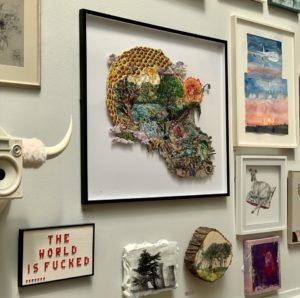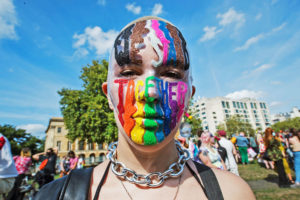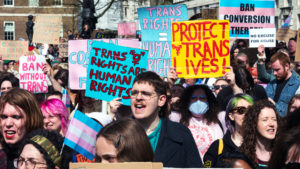It has now been a year since I woke up to nearly the entire UK press in my inbox, wanting to speak to me.
The Royal Academy of Arts had just publicly announced that they would no longer stock my merchandise in their shop, after a bunch of incensed embroiderers took it upon themselves to rally the virtual masses against me. Eight emails from “the public” were apparently enough to spook one of the UK’s major art institutions into submission and, without further ado, drop me like a hot potato — via Instagram, no less.
I have heard it said many times that cancel culture does not exist. My story would almost appear to support that idea: here I am, a year on, still making a living and sharing my views. For the last few months, I have been working on a huge embroidery piece; in a twist of fate that I would never have foreseen a year ago, it is about to be revealed in the Summer Exhibition at, of all places, the Royal Academy.

And it certainly seems, from what I’ve observed since last year, that cancel culture is in retreat. But that doesn’t mean it isn’t real — or that we should ignore what it has done.
Let’s consider what, exactly, I was being “held accountable” for. Why did I manage to accumulate, over the period of two years, a small but very vocal “anti-fan club”? What caused me to leave the small hair salon inside Soho Theatre’s dressing room that I ran for nearly nine years until late 2019, to subsidise my art career? What inspired the witch-hunting mob that subsequently sabotaged any of my art-related collaborations and relationships with stockists, including a regular gig selling embroidered patches at Liberty’s London?
All this was in response to an essay I wrote to express my steadily increasing concerns about gender identity ideology and its impact on women’s rights and boundaries, as well as children’s safety. When it comes to understanding basic biology, I, like most people, stick to good old science: there are two sexes, male and female. Intersex conditions are very rare and, contrary to the new ideological belief, do not a third sex make. Gender identity as an innate condition — “gendered souls” — is not something I believe in. After all, what is “gender”, if not a word describing sexist stereotypes?
I have compassion for those who are severely uneasy about their bodies and the stereotypes associated with them, but I do not accept the idea that “woman” or “female” is a feeling — an identity that one can opt into. Nevertheless, though my detractors would have you believe otherwise, I don’t hate those who disagree with me. That should go without saying. But sadly, in the age of cancel culture, it has to be spelled out.
Few noticed when I left my hair salon. Nobody came to my defence in a national newspaper when Liberty’s quietly dropped me. Back then, mine was a typical cancellation: hard to pin down, an accrual of several incidents that could be passed off as minor misfortunes, only half in public.
So, in some ways, I was lucky that the RA jumped on the bandwagon. That story was noisy, got a lot of attention, and inspired resistance. Dragged into the spotlight, the “activists” who’d been making my life harder for two years exposed themselves as the nasty bullies I’d always known them to be. The general public saw it happen, and rushed to my support. Ultimately, the chief of the RA apologised to me, and my merchandise was reinstated in their shop. It remains to be seen how long it will stay there.
The whole saga, while enormously stressful and upsetting at the time, was serendipitous in many ways: it actually hugely increased my art sales and commissions.
Still, my story could easily have ended badly. I know many whose have — those who have had their careers destroyed and their lives made hell, because they don’t believe a man becomes a woman if he says he’s a woman. The artist Nina Edge, for example, has been hounded and vilified online for her pro-woman stance by the people behind “The White Pube” and “Terfs out of Art”. She had opportunities stripped away from her and her name smeared. Then there’s Claudia Clare, a ceramicist who has recently been cancelled by Ceramic Arts London and banned by the Craft Potters association. Dance choreographer extraordinaire Rosie Kay, meanwhile, had to leave the company she built from scratch, due to ridiculous accusations of transphobia and the resulting hostility her employees directed towards her. I could go on. There are many more artists, writers and creatives who have had their lives turned upside down: some have reached out and connected with me, to escape the isolation such incidents can trigger.
Silence is deadly. Stonewall — a government-funded, formerly brilliant LGB charity that has made the “T” its new raison d’être — has been instrumental in quenching attempts to discuss gender ideology. Their “Diversity Champions” schemes are embedded in many companies and institutions uber-eager to appear on “the right side of history”. “No Debate” was the rebuttal to the ever-growing mountain of questioning voices, many of which echoed my own concerns regarding a proposed “Self-ID” law that would affect women and girls in sports, prisons, changing rooms and more.
Since the attempt to cancel me, that mountain of resistance has reached critical mass. More and more people have been willing to express criticism of this noisy ideology. There have been an increasing number of lawsuits against it. Allison Bailey is currently suing Stonewall. James Esses, a trainee therapist who launched a public petition trying to safeguard counselling for vulnerable children with gender dysphoria, is suing the university that expelled him via email for doing so. Gillian Philip, an author whose contract was terminated by HarperCollins, is bringing an Employment Tribunal claim against her former publishers, arguing that she should not have been discriminated against for holding and expressing gender-critical views.
All this has led to the “Self-ID” law being scrapped and “gender-critical” views (or rather, an understanding of science and biology) being protected in law. Meanwhile, many employers have actually left the Stonewall “Diversity Champions” scheme, after recognising that it creates a hostile work environment for people, like me, who are not taken with gender ideology. Among them are Channel 4, Ofsted, the Cabinet Office, and the UK’s equality watchdog, the Equality and Human Rights Commission (EHRC).
Common sense is, slowly, returning to public discourse.
It is essential for the people in charge to step up when gender ideology activists go too far. My own story illustrates that fact. When all hell broke loose last year, the Royal Academician David Mach reached out to convey his dismay at what had been done to me. After all, art requires freedom, and I had been cancelled for doing what all artists do: express our thoughts through our work. That should have bothered many more creatives, yet he was an isolated voice at the time.
A few months later, he contacted me again. Each Royal Academician involved with the Summer Exhibition can issue a few invitations to the annual Summer Show to artists they would like to participate. These artists do not have to go through the usual application process. David invited me. I know this wasn’t an easy stand for him to take; I am very grateful that he took it. And I accepted, of course.
Rest assured, this won’t go down well with the guild of envious embroiderers, much less all those who would like me to never say a word again, have any commercial success, or be given a platform as an artist. I am braced for them to screech: “How can you support this witch, especially during Pride month!?” They are screaming into a void. I’m not afraid of the lies, the smears, the intimidation. Truth has a habit of revealing itself in the end.

Concerned and influential voices within the arts are starting to come together, to protect one of our cornerstones: freedom of expression. JK Rowling and Graham Linehan bravely led the charge against this growing authoritarian movement, enduring considerable harassment. Finally, it seems, more and more people are willing to stick their head above the parapet. Comedians Dave Chappelle, Ricky Gervais and Bill Maher have publicly “come out” for common sense, taking on the zealots this movement has produced. The rather erratic protests they triggered helped highlight the absurdity of a movement that purports to have inclusivity and diversity at its heart, while trying to eradicate any dissenting voices that don’t toe the party line.
It’s a hopeful sign of the times that Netflix recently came forward to say it will not censor or reject people or shows on the grounds that they may make some people feel uncomfortable. A statement read: “If you’d find it hard to support our content breadth, Netflix may not be the best place for you.” Cultural institutions, take note!
Despite all the effort made by self-proclaimed “trans rights activists”, people in positions of power are finally realising that the movement’s temper tantrums have held far too many companies and institutions hostage for far too long. Have the adults finally come back into the room? Have years and years of grassroots feminist activism — by organisations such as Woman’s Place UK, Fair Play For Women and Sex Matters — finally shaken people awake, before we sleepwalk into disaster?
It’s easy to be discouraged sometimes. Particularly during the corporate festival that Pride Month has become: a month in which many companies, and even the police, rush blindly to pledge their allegiance to the ever-expanding LGBT+++ movement. (Mattel, for example, has a new “Trans Barbie”: same old sexist stereotypes but with a twist!) “Diversity and Inclusion” has become big business these days.
Meanwhile, many LGB people feel thoroughly disheartened — excluded from a movement that is supposed to champion them. What started as a protest for people’s right to be free to love who they love without stigma and discrimination has become a hostile environment. This is particularly true for those lesbians who point out that they experience same-sex attraction (not same-gender) — and that excluding males, however they identify, is not transphobic, but the very grounds on which their sexuality is based.
This too shall pass. In the year since I was cancelled, the tide has turned. Common sense will prevail and when it does, we will perhaps have learned a thing or two about genuine tolerance, compassion, diversity and inclusion.
In the meantime, you can see my work at this year’s Royal Academy Summer Exhibition. It is entitled: “Nevertheless She Persisted.”
Disclaimer
Some of the posts we share are controversial and we do not necessarily agree with them in the whole extend. Sometimes we agree with the content or part of it but we do not agree with the narration or language. Nevertheless we find them somehow interesting, valuable and/or informative or we share them, because we strongly believe in freedom of speech, free press and journalism. We strongly encourage you to have a critical approach to all the content, do your own research and analysis to build your own opinion.
We would be glad to have your feedback.
Source: UnHerd Read the original article here: https://unherd.com





